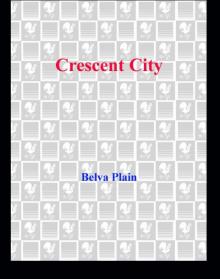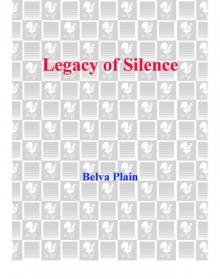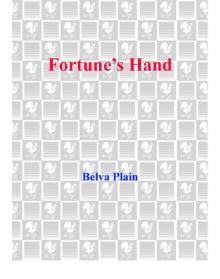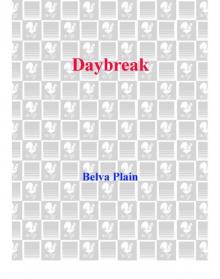- Home
- Belva Plain
Eden Burning Page 35
Eden Burning Read online
Page 35
“Keep an eye on Will,” Kate had warned. Oh, by all means! And just how was he to do that? Will was a man now, or more a man than almost any other boy his age. You couldn’t pin him down!
“Where were you?” one would ask.
“Out with friends,” he would answer.
“Yes, but where?”
“Just walking around, down on the beach.”
You never could get more out of him than that. And what if you did pin him down, saying, “We know you spend time at the Trenches and we don’t want you to go there anymore.” What good would that do?
He wondered what Will and his friends really did talk about, what interested them besides Che Guevara and Mao. No, not Mao anymore; he’d gone out of favor, like so many left-wing heroes. At Will’s age, Patrick thought, what I cared about were girls and books and wanting to know some more of the world. I wasn’t angry like him, I know that much. And I remember I could laugh a lot. Will never does, at least not when he’s home with us. No, you couldn’t pin him down.
Nevertheless, he asked point-blank that night, “Will, I want to know, are you mixed up in anything political?”
Will gave him a long look. “Why do you ask?”
“Because I’m worried. I don’t challenge your right to believe in what you believe, and by this time obviously I know what you believe. But I don’t think it’s safe for you to be too outspoken right now.”
“Right now? I thought this was supposed to be a democratic government. Free speech, freedom of thought and all that.” There was a taunt in the way Will said it.
Patrick found himself struggling, put once again on the defensive. “It is a democratic society! But it takes time to develop orderly democratic societies in which people think for themselves.” He mouthed and floundered, repeating, “It takes a long time, and in the meanwhile, during a period of stress—”
“Each of us has only one lifetime,” Will said. “How long are we supposed to wait? In the meanwhile,” he went on before Patrick could reply, “there’s been no change. Take the Francis family, the Tarbox family. The worker tends the bananas, and the profits go to a fancy house in England, or maybe the Riviera, or wherever else those people travel to make themselves comfortable.”
Back to the Francis family again. Always the Francis family. Strike, and strike the sore spot. Will knew how to do that!
“Tell me, are you so satisfied with what you’ve had since Mebane got in?” the boy demanded now.
“Not entirely, no, I’m not. But never forget, we’ve a way to change things when we’re not satisfied. The ballot is our defense, a most precious defense. When you think how few peoples in the world have the right to vote, you’ll treasure what we’ve got.”
“Vote for this one, vote for that one—it makes no difference. I’ll take the Cuban way and you can keep your ballot.”
“Oh, it’s tempting, isn’t it? No vote, just one man, quick and efficient, who gets things done without a lot of committees and talk! Justice and equality at the stroke of the great man’s pen! Only it isn’t equality. Listen”—and earnestly now, trying to convince, to force the boy to understand it as he understood it, Patrick thumped his fist into his palm—“listen to me! Do you really think people are equal under those systems? Why, the leaders in Russia have every privilege and luxury that kings ever had, things the masses never even see. And what’s more, they have the power of life and death over those masses. Equality!”
“Life and death,” Will said. He spoke calmly. He looked off, looked at the wall behind and above Patrick’s head, as though he were considering whether to say something else or not. Then he stood, leaning with one elbow on the mantel, a habit which made Patrick nervous. Will made such abrupt movements, so rough and sweeping, and Désirée’s Royal Copenhagen figurines, those fragile blue-and-white milkmaids and goosegirls, patiently collected at Da Cunha’s, were so treasured. But he had never broken one yet.
“You know, of course, what’s happening with the Red Men,” he said at last.
“Happening?” Patrick repeated.
“Yes.” Will was patient, intense and old.
He’s never been young, Patrick thought, as eye contact was made between them. And he evaded. “Well, there are too many of them—”
Will interrupted. “It’s not what you see, it’s what you don’t see. It’s what they do when they take off the uniform, it’s the ones who never wear the fancy uniform at all. And there are hundreds of them, that even you don’t know about. Talk of the power of life and deaths—” He broke off. “But you won’t want to hear because Nicholas is your friend.”
“He was a brother to me,” Patrick said slowly, as if murmuring to himself.
“Well. Brothers do strange things, too.”
To know so much, to be so cynical, at seventeen!
“You’re in the government, but you haven’t the faintest idea what the government is. Don’t you realize at all what’s going on behind your back? The Daniel sisters’ car crash last month—take that, for instance. You thought it was an accident?”
“Everyone thought so.”
“Not everyone,” Will corrected. “That car didn’t skid off the road. The sisters were shot by Red Men and then the car was shoved over the cliff. That’s what really happened.”
“But why?”
“They ran a whorehouse, a fancy place for tourists on the Westbrook Road. They were murdered because they got too sure of themselves and stopped paying off to Alfred Claire. That’s Mebane’s cousin—of course you know that. Don’t you see the whole family’s on the take, milking the country?”
“But where do you hear these things, Will? How can you say these things?”
“I say them because they’re true.” Will smiled. He had a one-sided, reluctant smile, almost wistful. “My friends and I—we have ways of knowing.”
Kate and her sources, Patrick thought. He was dazed. From the nature of democracy to Cuba and communism and now to whorehouses and murder, all in less than half an hour! How could he know who was telling the truth?
“I don’t know whether to believe all this,” he said.
And again Will smiled, that strange, touching smile.
“Believe it,” he said.
“The Mebanes are having a housewarming,” Désirée announced.
Nicholas’s house had been completed in the new community on the cliff at Cap Molyneux. Through Désirée, Patrick had been informed almost daily of its progress, its Italian tile, the pool, and the great curved room. “Like the prow of a ship,” she reported.
“I don’t want to go,” he told her.
“What! What can you be thinking of? Never mind my feelings and Doris’s if we don’t go, but how will it look? The only member of the government to stay away? And you on the executive committee?”
“The executive committee hasn’t met in months and it’s only a rubber stamp anyway, as far as I’m concerned. I’m a minority of one.” He could hear his own bitterness.
“Well, maybe that’s your fault! Anyway, what has it got to do with the party?”
She was right, of course. It would be very strange indeed to stay away, conspicuous and strange. So, still as troubled as he had been during these last weeks, Patrick got himself dressed up and went.
It was an eagle’s aerie. On a plateau at the top of the mountain stood a small cluster of new houses. Men retired from industry in North America and Germany and Sweden had built them with a view of endless ocean and more than a thousand feet of jungle below. The Mebanes’ house adjoined the Jürgens’, where through a gap in the shrubbery the Jürgens’ peacocks could be seen, flaunting their fantails as they passed the hidden floodlights.
Patrick walked out to the far end of the terrace and sat down on the parapet. Indoors the buffet table bore flowers, food, and quantities of silver. Here on the terrace people were dancing to the music of the stereo. And he turned his head away, to stare downward at the quiet, black sea. Certainly it was not that he ever disapproved
of music, wine, and dance! Rather it was that, in some subtle way, this place and the people here tonight had removed themselves, so it seemed to him, from the struggling, throbbing life beneath them, where even now a weak light streaming from some night fishermen’s little skiff brightened the dark water with a moving stain of indigo.
It was cool at this height, almost cold. The cold cleared his head.
Did none of these people see or care what was happening to the country? Surely others of them beside himself must see, although none spoke! Only from below there in the villages came the sounds of discontent and restless hope.
Since Independence Day there had been a surging of the mass, people streaming out of the countryside, seeking mecca in the town. That sour, tragic area known as the Trenches was flowing over. Packs of defiant, idle boys had begun to rove through the streets, mugging and stealing. Did no one see the writing on the wall? His hands clenched in his pockets, so that the nails dug into the palms.
At what point, when and how, had Nicholas Mebane, with his quick, discerning mind, so keen and clear, at what point had he been corrupted and beguiled? Now, below the surface of that mind, lay revelations at which Patrick could never have guessed. It was like peeling off layers of clothing and finding some secret deformity of the flesh, or like finding a stranger wearing the familiar features of another. Was it power alone that had brought this change? Or could it have been there all the time, awaiting its hour all these years, unrecognized by one who loved him?
Oh, people changed, everything changed! That was the one thing you could be sure of. Francis Luther. Better not to think of him. Think of himself. Think of Désirée and his love for her, which, no longer the dazzle of first youth, but deeper now, more clear and tender, could comprehend and smile at her mood when, raising his eyes from the sea, he saw her pass; her laugh was happy as she flashed in her new dress, bought after such decisions made and unmade, as though her fate depended on it. Lovely, kind, and foolish Désirée in the fluttering dress, poor woman-child, to be so enthralled by all this—this tinsel!
Yes, people changed, But not as Nicholas had done.
How many years since those first days at school? “Come on home for lunch,” he said, and I went and thought his father’s middle-class, clean house on Library Hill was a palace.
Next door the peacocks blared their harsh cry. And Patrick stood up, turning away again from the chatter and glitter to look back over the dark sea. He brushed his hand across his eyes. He could have wept.
The man inside this house was dangerous.
What to do, but admit to yourself that you’re afraid? He was helpless. Three or four times he tried to talk to other members of the government, but always, even from his most careful, tenative approach, they drew away, either in alarm and fear or because of their own complicity. There was no way to tell.
And suddenly the storm was upon them all. Suddenly the newspapers of the world made the name of St. Felice familiar to millions who had either never heard it before or had forgotten it if they had.
A prominent feature writer for a popular journal came to the island and sent home an article about the growth of dictatorship on St. Felice. Two days later he was shot to death in the garden of Cade’s Hotel, his body, with a bullet hole in the temple, having been discovered there by a waiter.
Passing the scene on Wharf Street, Patrick felt compelled to go in, which was odd, since he was ordinarily one of those who shun the scene of an accident because they can feel the intensity of pain in their own flesh, as if they were themselves the victims. Yet he went in.
Cade’s had gone to seed. The twentieth century had at last arrived on St. Felice. The Lunabelle and its kind, with their glass and steel and chrome, their neon and plastic, were proof enough of that. Cade’s had remained in the nineteenth century. The sugar bowls still stood in saucers filled with water to keep the ants out. A shabby old Englishman, who either couldn’t afford the Lunabelle or would not go there, was having his morning tea on the veranda as Patrick, having seen the spot in the garden where a large red-brown stain was all that remained of a decent, talented young man, went down the steps and out into the morning. For an instant he looked back at the old building where he had brought Désirée for their first gala dinner together, and where they had spent their wedding night. He was deeply moved. Everything was bound together, his life with Désirée, the murdered stranger, the old Englishman, everything. All of us, all in the flow of time.
What to do?
He got into his car, having no idea where he was going or why. He knew only that he had to move. He could not have said whether it was despair or fear, in its nakedness and shame, that moved him. As he sped along the road, his vision grew sharp; it was as though he had been given a glass that magnified the world. He saw a dead dog on the road and hoped it had died quickly, without pain; too often one saw agonized animals in the ditches, dying in the broiling sun. On either side of the car the cane grew tall. It was like running a jungle path; a bird’s eye would see it as a canyon between green cliffs. He could see the workers moving steadily, cutting in pairs. Once, catching a bar of song in the wind as he went by, he recognized it as a chant to ease the labor. These were the men with whom he had once, in the village, been a boy. And again he felt a rare, exalted kinship with all people, all living things.
At a village rum shop, one of those places where men came to drink and play dominoes, he stopped the car. A jukebox blasted out a raucous tune and voices had to rise above the noise, but no one turned it off. Noise probably gave life to the midafternoon, for the men at these tables were not working; this was slack time, and they were talking about credit—how they would get it and whether it would be enough to carry them through until they could go back to work. Patrick knew they had been talking about it. When he took a seat and asked for his drink they lowered their voices or stopped speaking. He saw that they did not recognize him. He was not prominent enough in the government for his face to have become familiar. It was his clothing and his light skin that told them what class he came from. It was these that had silenced them. They didn’t trust him. They were afraid of him. Yet he was of them and he understood them, although, if he were to tell them so, they would surely not believe him. True, he had left them behind; true, as a child in a village like this one, he had already been different from them in many ways. And yet he was of them because he understood them. He had never felt that as clearly as he did now.
He finished his drink quickly and got back into the car. Quite suddenly, he knew what he must do. And he drove rapidly back to Covetown, parked the car at Government House, and went up the steps two at a time. He remembered that, one day as they passed this tall, white portico, Will had remarked that the more things change the more they remain the same, meaning that the color of the men who occupied this mansion had made no difference after all.
He was admitted to the beautiful square room where Nicholas sat.
“Nicholas, what’s happened to you? I demand to know.”
“Sit down,” Nicholas said agreeably. “I’m not sure I know what you mean.”
Patrick drew his chair to a place where he would not be staring into the light. Strong men liked to discomfit their visitors by putting them in the face of the light, he remembered.
“What’s happened to this government? Suddenly—or not so suddenly—everything’s caved in.”
“Caved in?” Nicholas’s eyebrows made two inverted v’s of surprise. “Aren’t you being somewhat dramatic?”
“Don’t turn me off, Nicholas. You made promises to me, to us all. And you haven’t kept them.”
“What do you want me to do? Rub Aladdin’s lamp and make your wishes come true overnight? Well, I can’t do it!”
“I said, don’t turn me off, Nicholas. There’s a stench in this land. A stench the world calls fascism.”
Nicholas looked across the desk at Patrick. His glance traveled to the open-necked shirt, of which, Patrick knew, he disapproved; then it traveled ar
ound the room, fastening first on a crystal paperweight, then on the bunch of keys he had taken out of his pocket, and finally on his own finger, where shone a diamond on a narrow gold band. Then he spoke.
“The world, meaning a handful of reporters, doesn’t know what it’s talking about. If there’s any stench, as you put it, it’s wafting from the other direction. Good God, you know what’s going on? You know Moscow, through Cuba, is exporting terrorism all through this region. Listen to me, my friend. We face serious trouble. Maybe you don’t realize how serious. You know what’s being smuggled into this country? Arms, Patrick, rifles and hand grenades, landing on our beaches night after night. I haven’t wanted to make it public knowledge because the people who are doing this will take advantage of the slightest unrest, of a thing like a teachers’ strike, for example, anything, to further their cause. And we can’t afford to let them do it unless we want to give in and give up right now. We have to fight strength with strength. Only a strong government—”
Once Nicholas had had the power to mesmerize him, but no longer.
“This is no ‘strong government.’ This is a rotting government.”
“I don’t like the sound of that, Patrick.”
“Do you think I like it, either? Oh, Nicholas, what’s happened between you and me? From the very beginning, after all our hopes, you shut me out, me and every idea I had. You gave me a sinecure and got rid of me. Why?”
“Because I found out early on, during those first few weeks, that you had no grasp of affairs. You live a boy’s life in a man’s world. It’s one of your most appealing and most exasperating qualities. You want utopia right now. But there is no Santa Claus, Patrick.”

 The Golden Cup
The Golden Cup Her Father's House
Her Father's House Whispers
Whispers Crescent City
Crescent City Legacy of Silence
Legacy of Silence Crossroads
Crossroads Promises
Promises After the Fire
After the Fire Tapestry
Tapestry Looking Back
Looking Back Heartwood
Heartwood The Carousel
The Carousel Fortune's Hand
Fortune's Hand Homecoming
Homecoming Random Winds
Random Winds Harvest
Harvest Evergreen
Evergreen Treasures
Treasures The Sight of the Stars
The Sight of the Stars Secrecy
Secrecy Daybreak
Daybreak Eden Burning
Eden Burning